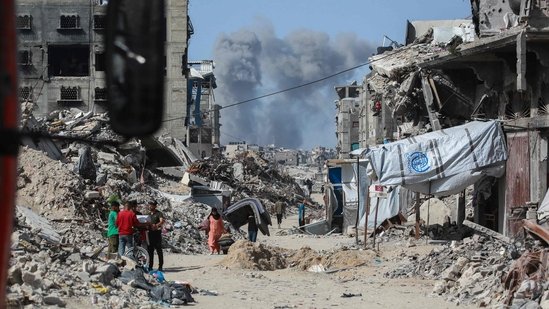
Israeli Prime Minister Benjamin Netanyahu has strongly criticized some of Israel’s closest allies, including the United Kingdom, France, and Canada, for opposing the country’s military operations in Gaza. Netanyahu said that their criticism is like giving a reward to Hamas for the October 7 terror attack, which started the ongoing war. His comments come at a time when global concern is rising over Israel’s actions in the city of Rafah in southern Gaza. More than a million displaced Palestinians are currently sheltering there, and many international leaders fear that a ground invasion could lead to a humanitarian disaster.
The war began on October 7, 2023, when Hamas militants carried out a surprise attack on Israeli towns, killing over 1,200 people and taking hundreds of hostages. In response, Israel launched a large military campaign against Hamas in Gaza. Since then, thousands of Palestinians have died due to Israeli airstrikes and ground operations, and major parts of Gaza have been destroyed. The conflict is now in its eighth month, and it continues to draw international attention as conditions worsen for civilians, especially in Rafah.
Netanyahu responded sharply to recent statements from the UK, France, and Canada, saying that they are sending the wrong message to terrorists by criticizing Israel’s right to defend itself. He stated that Israel is fighting a just war against a brutal enemy. He added that ignoring the horrors of October 7 gives Hamas hope that global pressure will protect them. Netanyahu said this kind of pressure tells terrorists they can kill, rape, and kidnap, and then hide behind civilians to gain international sympathy.
The UK Foreign Office has said it is deeply concerned about the humanitarian situation in Gaza and has asked Israel to follow international law. French President Emmanuel Macron has called the situation in Gaza unacceptable and is demanding an immediate ceasefire. Canada’s Prime Minister Justin Trudeau has warned that more attacks in Rafah could cause a massive loss of life and make the humanitarian crisis even worse. All three countries have also shown support for a two-state solution, where an independent Palestinian state can exist peacefully alongside Israel. However, this idea is not currently supported by Netanyahu’s government.
Rafah has become the new center of conflict. Israel says Hamas leaders are hiding there and using civilians as human shields. The Israel Defense Forces (IDF) recently ordered people in eastern Rafah to evacuate. Soon after, the army began airstrikes and ground operations. Aid organizations say it’s impossible for people to move safely and warn that more attacks could cause even more suffering. Despite these warnings, Netanyahu has said Israel must complete its mission to remove Hamas from Rafah. He explained that this war is for Israel’s survival, and stopping now would only allow Hamas to regain strength.
While the United States has also expressed concern about civilian deaths, it has shown more support for Israel compared to other Western countries. The Biden administration has said that any military action in Rafah must include a plan to protect civilians. The U.S. even delayed weapons shipments to Israel due to concerns about how the war is being handled. Still, it continues to provide military support and recognizes Israel’s right to defend itself. At the same time, public pressure is growing in both the U.S. and Europe to stop the war and reach a permanent ceasefire.
According to the Gaza Health Ministry, over 35,000 Palestinians have died since the war started. Many of them are women and children. Netanyahu believes that criticism from allies is weakening Israel’s ability to win the war. He said that telling Israel not to attack Rafah encourages Hamas to think they can survive through outside pressure. Netanyahu reminded the world that no democratic country would allow the kind of attack that Israel faced on October 7 without responding. He stressed that Israel is not targeting civilians, but that Hamas has placed its fighters and weapons in areas filled with civilians, including hospitals and schools.
Meanwhile, international aid groups and human rights organizations have raised the alarm over the worsening humanitarian crisis in Gaza. They say that Israeli military actions are blocking access to food, water, and medicine. Children are dying from hunger and disease, and medical services are barely functioning. The United Nations Relief and Works Agency (UNRWA) has called for an immediate ceasefire and full access to deliver aid safely into Gaza.
At the same time, Netanyahu is also under pressure inside Israel. While many citizens support the army and want Hamas to be defeated, there is frustration over the fate of the hostages still held by Hamas. Families of the hostages have called on Netanyahu to make a deal for their release, even if it means a ceasefire. Some Israeli opposition leaders and former army officers have also suggested that diplomacy and negotiations should come before military goals. On the other hand, Netanyahu’s far-right allies in government are demanding stronger action and no compromise with Hamas.In conclusion, the war in Gaza has caused deep divisions not only between Israel and Hamas but also between Israel and some of its traditional allies. Netanyahu’s tough stance is meant to show strength and determination, but it is also creating tension with leaders in the West who are calling for restraint. As Rafah becomes the new center of violence and humanitarian concerns, the world is watching closely to see whether Israel will continue its offensive or change direction under international pressure. Whether Netanyahu’s message will silence critics or lead to deeper global disagreement is still uncertain.































